- Home
- Jane Peart
Destiny's Bride Page 2
Destiny's Bride Read online
Page 2
Recalling Alair's own prediction and the brevity of her charmed life served only to make me aware of how fleeting are our days, even if they are filled with romance, travel, and wealth.
Randall's face superimposed itself on the portrait before me. The awful transition from his wedding-day happiness to the tragic mask I had seen today wrenched my heart. Too, the faces of the little girls, framed in their black poke bonnets, appeared before me, touching me again with their innocence and vulnerability. What would become of them all?
After Mama, Aunt Garnet, and Auntie Kate had each spent time in Aunt Harmony's darkened upstairs bedroom, we said our good-byes and drove back to Cameron Hall in silence.
Since Mama and I had plans to leave the next morning to return to Richmond, we retired early. Wearily I removed my simple dark-gray dress and sank onto the bed, but I could not dispel my melancholy mood after the depressing events of the day.
"If Jonathan were only here," I murmured. He, more than any other, would have understood what Alair's death meant to me. It was the end of a time when every day had been filled with sunshine.
As children we three could not have known what our mothers and Aunt Garnet, who took Jonathan's mother's place after Aunt Rose died in that awful fire, endured. If the grown-ups were worried about the war, their husbands' safety, or providing food or money or clothing for us, we never knew. For us it was a magical time.
Now reality had ripped away some of that remembered enchantment.
After the war Jonathan had gone to live with his mother's relatives, his Uncle John and Aunt Frances in Milford, Massachusetts, where the Meredith family were wealthy mill owners. It was what Aunt Rose had wanted. Shortly before she died, she made Aunt Garnet promise that Jonathan would go to the Merediths if Uncle Malcolm didn't come home from the war. And he hadn't. Not right away, that is. We learned later that he had been captured and held in an enemy prison camp, then had gone west to try to recoup his fortune in the gold fields of California. Eventually he had come home to Montclair, bringing a new bride, but Jonathan never came to live with them.
I knew that Aunt Garnet had sent Jonathan a telegram about Alair's death, but he would not have received the news in time to come to the funeral.
What would he have thought of Randall Bondurant and Alair's two pitiful little girls? The poignant picture of the little family haunted me. I could still see the children in their identical white dresses sashed with black ribbon, their black capes billowing in the wind.
That scene of the bereaved father, the motherless children, begged to be committed to paper. I got out the sketchbook I always carried with me and began to draw my impressions.
I'm not sure how long I worked at it, but I was not satisfied with my quick rendition when I finished it. I studied it for a long time then put it away.
The memory was not so easily laid aside. I lay awake for some time before finally falling into a shallow sleep, troubled with strange dreams and sudden awakenings.
Back in Richmond I continued my preparations for my first year of teaching. Thornycroft sounded dismal to me, and Massachusetts, a world away. Still, I was cheered by the prospect of a reunion with Jonathan, now a student at Harvard, which was located near the school where I would be teaching.
With the time for my departure approaching, Mama grew pensive, and I found myself consoling her, rather than the reverse behavior.
"You know how much I hate leaving you, Mama," I said, "but the salary Thornycroft pays is more than is paid by any of our southern academies. And with the money I will be able to save, we'll soon be able to afford a place of our own."
She gave me a wan smile and patted my cheek, but she didn't say any more.
The Sunday before I left for Massachusetts, Mama and I went to church together as usual. It seemed to me that both the text for the sermon, Isaiah 58:11, and the closing hymn had been chosen just for me.
He leadeth me! O blessed tho't!
O words with heavn'ly comfort fraught
Whate'er I do, where'er I be,
Still, 'tis God's hand that leadeth me!
He leadeth me, He leadeth me,
By His own hand He leadeth me:
His faithful foll'wer I would be,
For by His hand He leadeth me.
I sang the words with complete assurance that they were true.
I was glad I'd been grounded in that kind of truth from an early age, but I had no idea how my faith would be tested in the days ahead.
Mama insisted on coming down to the depot with me to see me off on the train although I begged her not to, knowing how hard it would be to say good-bye. As we kissed and hugged for the last time, I said through my tears, "Next year, I'll find a job closer to home, I promise."
Mama's small figure grew smaller and smaller as I looked back from the train window. My last glimpse of her, waving bravely, strengthened my determination to keep that promise.
There was no way I could know that day what unexpected circumstances would make my promise impossible to keep.
chapter
3
THE FIRST TIME I saw Randall Bondurant was at Alair's wedding; the second time, at her funeral. I never expected to see him again.
Once in a while, though, I'd come across that sketch I'd made of him and of the two little girls, and I would be reminded of him. I would study the features I had drawn from memory, knowing that I had failed to capture something intrinsic in the expression, something hidden in the eyes, something just beyond my skill to grasp.
The faces of the children had come quite easily. It was Randall's face I had kept erasing, resketching, yet never feeling satisfied with.
I'd put it away again, wondering why it continued to fascinate me.
To tell the truth, ever since I had been in their wedding, Randall had been a romantic figure in my imagination. In the sheltered world of my childhood, he had emerged like some hero out of a fairy tale—a darkly handsome prince, dashing and mysterious. He had spoken but a few words to me after the ceremony, but bowed over my hand, kissed my fingertips, and declared me the loveliest bridesmaid in the bridal party. He had been gracious to all the family, charming them in spite of their pride and prenuptial prejudice.
I realized he had remained in my imagination all these years, fantasy having obscured the reality I had seen that day. I studied my sketch of his ravaged face. Still superimposed upon the penciled lines were the godlike features of my girlish dreams. With a sigh I gave up and slid the sketch back into my portfolio.
I had little time for such thoughts of the past. There were so many new people, new sights, new experiences surrounding me in my position. My teaching assignments were demanding, my pupils interesting, and my time fully occupied with duties. Although I was very lonely at times, the longer I was at Thornycroft, the farther away Virginia seemed.
The brightest spot in my first winter in New England was Jonathan. The first day he came to see me, he created quite a stir among the female students, which didn't surprise me.
I've always thought Jonathan should be the subject of some great sculpture. Tall and well built with black curly hair worn rather long like a poet's, his eyes are dark and full of intelligence. But just when he may seem to be much too serious to be interesting, a dimple pops out in his left cheek, his eyes twinkle mischievously, and he breaks out in a disarming grin. Dear Jonathan!
We had a glorious time that day, for it was my afternoon off. We lunched at an elegant hotel, where we interrupted each other frequently in our eagerness to catch up on all that had happened in our lives since we had last seen each other. Of course, a main topic of our conversation was Alair's death.
"There's really quite a bit of mystery about that," I told him. "Her horse came back to the stables with the stirrup broken. They found her body later in the woods. Whether she was thrown or somehow fell off and struck her head on a rock, no one knows for sure. But the cause of death was a skull fracture, so they say."
Jonathan shook his head. "I
find it hard to believe. Everyone knows that Alair was practically born in the saddle."
"I know. It was a shock to everyone."
There was a lull in the conversation while we finished our lobster bisque.
"How is Auntie Kate?" he asked. I knew he was eager for all the news, since he had chosen to take the grand tour of Europe, a gift from his Uncle John, instead of visiting Mayfield the summer before.
"Oh, as dear as ever!" I told him. "She has arthritis, but you never hear her complain. She's up early every morning, working in her beloved garden."
"And your mother?"
"Mama's fine, Jonathan. She's still taking care of Aunt Nell Perry, you know." I paused. "That's one of the reasons I took this job at Thornycroft. The pay is so much better than I could get closer to home. I hope one day to be able to support Mama fully . . . so we can have our own home."
"Don't tell me you plan to be a spinster, Dru," he teased. "Surely there's some young man in Virginia pining away for you to come back and marry him."
I blushed. "Not really, Jonathan. I don't have any intentions of marrying until Mama is comfortably settled."
"—Unless you find some rich bachelor, as Alair did." Jonathan had barely uttered those words when he halted, looking stricken. "What a stupid thing to say! I'm sorry. It just slipped out."
"I understand," I said, remembering Alair's ambition. "But then we both always knew Alair felt she had to marry money. I think she always loved Brett Tolliver, but he was just as poor as the rest of us."
"Well, it was a terrible thing to say." He seemed genuinely ashamed. Then he asked, "What about her two little girls, her husband? What's happened to them?"
"All I know is what Mama wrote. Shortly after the funeral, Bondurant closed the house and took the children and went away—nobody knows where."
Jonathan changed the subject. "How about Uncle Rod?"
"He wasn't in Mayfield when we were there. Auntie Kate said he had gone to Ireland . . . on a horse-buying trip."
Uncle Rod raised and sold thoroughbreds, and had a profitable business. So profitable was it that Auntie Kate was able to close the school.
I leaned forward and added in a stage whisper, "Later I overheard Aunt Garnet say to Mama that she hoped Rod wasn't on another 'wild goose chase'—whatever that means!" I giggled. "Have you ever known a family with so many secrets, Jonathan?"
When we had drawn out our luncheon until we noticed the waiters exchanging disapproving looks, we withdrew reluctandy and walked back to Thornycroft in the brisk sunshine. At the gate Jonathan promised to come again soon.
"Aunt Frances wants you to come out to the house. They're all anxious to meet you—especially Norvell. But I'll have to warn you about my cousin. He has an eye for pretty girls."
"What about you, Jonathan? Is there anyone special in your life?"
Immediately he colored. "Well . . . yes." He smiled shyly. "You'll meet her when you come out to Milford. Her name is Davida Carpenter. Her father, Kendall Carpenter, used to be in love with my mother. That was before she met and married my father. Small world, isn't it?"
We laughed together and said good-bye, Jonathan telling me that Mrs. Meredith would send a written invitation for the weekend-after-next.
It was too far, too expensive, and the weather too uncertain for me to attempt the long trip to Virginia for Christmas, so, at their invitation I spent the holidays with the Merediths.
Their huge, many-gabled house of brown shingles was circled with balconies and verandas. Inside, all was homey warmth. Fires crackled cheerfully in every room. Bright curtains hung at the windows and braided rugs splashed color and warmth underfoot. Books crammed ample shelves and spilled over tabletops, and framed landscapes adorned the walls.
It was a lively, happy place to be. Someone always seemed to be playing the piano, opening doors, running up and down the wide staircase.
Presiding over the kitchen was a good-natured Irish cook named Birdie. The downstairs maid, Violet, and an upstairs maid called Polly kept everything in order with a minimum of direction from the efficient Frances Meredith. Looking on with amused tolerance was Jonathan's Uncle John.
The whole ten days of my visit, the house was filled with young people—Norvie's and Jonathan's classmates from Harvard and Norvie's sister Ellen's girlfriends from Milford's Day Academy.
I discovered to my surprise that Northerners could be as gracious and hospitable as Southerners.
I roomed with Ellen, who was a delightful chatterbox. I think she had a hopeless crush on Jonathan, but true to his word, he proved to be devoted to the quiet but very lovely Davida Carpenter.
There were taffy-pulls and popcorn parties, games of Charades and Quotes, square dances, and round-robin suppers, where we went from house to house for each different course.
I learned to ice-skate on the frozen pond behind the house, often with the roguish Norvie as my partner. Jonathan was right: His cousin was a polished charmer. Forewarned, I took all his compliments with the proverbial grain of salt.
Two days before Christmas we all went into the woods to select a tree. After cutting it down, we dragged it home and decorated it with yards of popped corn and cranberries draped over its fragrant cedar boughs. Then we hung cornucopias filled with candies, paper rings, tinsel stars, and painted angels with gilt wings. Finally, when the tree was abloom with its borrowed finery, we topped it with a perfect gold star.
Gathering around the spinet, we sang familiar carols until the silent night vibrated with our joyous welcome to the Christ child. One by one we found a comfortable spot near the fire and, sipping mugs of spiced cider, brought the evening to a peaceful close with stories of childhood Christmases past.
Christmas Eve was the loveliest of all. We attended the midnight candlelight service in the steepled, white frame church in the village, then walked home across the snowclad roads that glistened in the cold moonlight to open presents and feast on fruitcake and punch. Finally we tumbled, exhausted, into our beds as the first gray light of dawn was peeping over the hills.
Mama's Christmas present to me had arrived before I left Thornycroft. I opened the package with great anticipation, knowing Mama always made me something very special. I pushed aside the tissue paper eagerly and lifted out a beautiful, green taffeta dress. It rustled and shimmered as I shook it out, then held it up against myself and looked in the mirror. The color was perfect, making my chameleon blue-green eyes shine like emeralds. It was fashioned in the newest French style with an overskirt drawn back, fluted flounces rippling down the back, and corded braid trim in a darker green velvet. I knew that Mama, an expert seamstress, must have copied it from one of the Parisian fashion plates published in her pattern books.
I wore it the night of the New Year's Eve party to the envious sighs of Ellen, the approving nod of Aunt Frances, and Norvie's admiring smile.
For the first time in my life I think I felt really attractive. I had always compared my looks to Alair's Dresden beauty, having grown up thinking myself too tall and thin, my thick dark hair too heavy to curl in contrast to Alair's blond ringlets. That night, though, my dance card was filled, and the in-between sets were vied for by several young Harvard men. I basked, at least temporarily, in the fleeting popularity of a "belle."
At midnight I found myself under the mistletoe with Norvie who, much to my astonishment, gave me my first "non-kin" kiss.
Then we all clustered around the prophecy cake Aunt Frances had baked, waiting for the favors we might find in our own slice that might foretell what the new year held for us. A tiny metal ship meant a sea voyage; a shiny penny meant an inheritance or fortune, and so on. When I found a wedding ring, I was immediately the target for all kinds of teasing conjecture.
I looked over at Jonathan, wondering if he remembered my declaration that I had no intention of marrying until I had secured my mother's comfort. But Jonathan had eyes only for Davida—a slim, pretty girl with fly-away brown hair and merry, gray eyes.
I
enjoyed my holiday with the Merediths so much that returning to Thornycroft proved overwhelmingly depressing.
I had already found faculty life unduly restrictive for a person of my artistic temperament. With no outside contacts except the girls' parents and no person of my own age among my colleagues, I sometimes felt that if I stayed there I might wither inside, grow older, crankier, and more eccentric every year. If the routine and rules were hard for the girls, the expectations required of the teachers by headmistress Amelia Pitts were impossible. I lived for my freedom on Thursday afternoons.
That is why on a particular Thursday—a windblown, blue day in mid-March—I was filled with a restless desire to escape. I packed a reed basket with a sketchpad, my small box of watercolors, a piece of plum cake, and an apple from the kitchen.
As free as any child playing hooky, I sprinted through the orchard behind the school, took the path through the woods, and crossed the curved stone bridge to the park. I found near the children's playground an empty bench on which to eat my picnic.
From there I had a view of the lake, where black swans glided, and of the graceful willows just beginning to green. I could see the swings and slides where the uniformed nannies from the great houses fronting the Commons brought their charges later in the afternoon.
I had been sketching happily for perhaps an hour when I looked up from my pad and spotted the two little girls. It may have been their outfits that caught my attention—purple-velvet caped coats and bonnets, fur-trimmed and beribboned and much too fussy for playing freely on this springlike afternoon. Or maybe it was the dour-faced woman in black sitting on the bench opposite the swings, who seemed forever to be barking directions, corrections, and admonitions.
Oh, why doesn't she let them alone! I thought to myself. Let them enjoy themselves!
In spite of the continual harping of the sharp-featured woman with a sour expression, the two little girls seemed to take delight in each other, and the sound of their pure laughter warmed my heart. Suddenly I longed to capture the essence of this moment of innocent happiness.

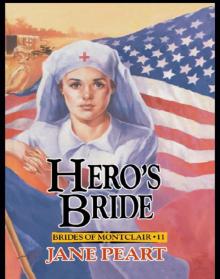 Hero's Bride
Hero's Bride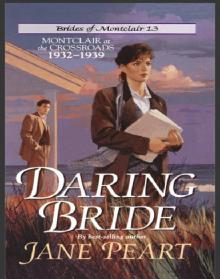 Daring Bride
Daring Bride Runaway Heart
Runaway Heart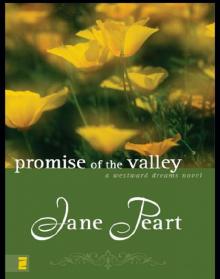 Promise of the Valley
Promise of the Valley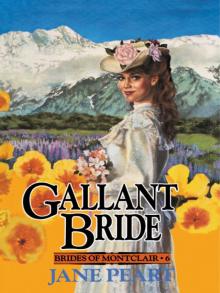 Gallant Bride
Gallant Bride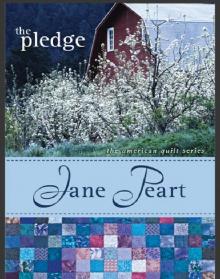 The Pledge, Value
The Pledge, Value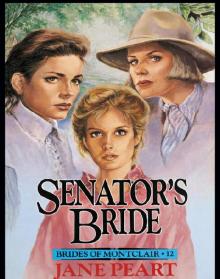 Senator's Bride
Senator's Bride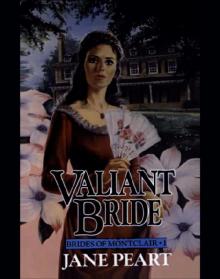 Valiant Bride
Valiant Bride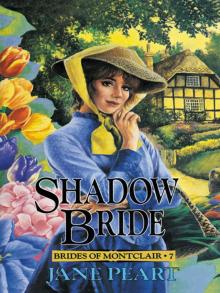 Shadow Bride
Shadow Bride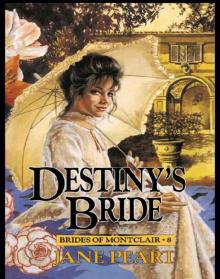 Destiny's Bride
Destiny's Bride A Tangled Web
A Tangled Web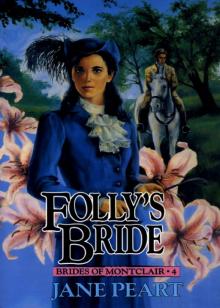 Folly's Bride
Folly's Bride The Promise
The Promise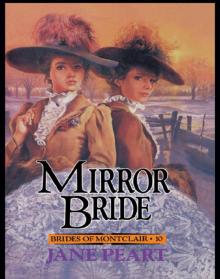 Mirror Bride
Mirror Bride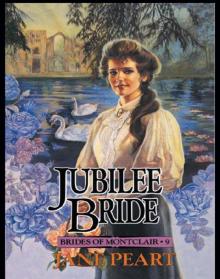 Jubilee Bride
Jubilee Bride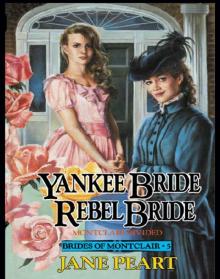 Yankee Bride / Rebel Bride
Yankee Bride / Rebel Bride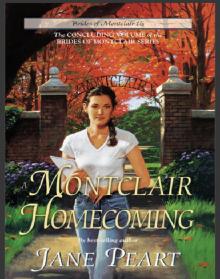 A Montclair Homecoming
A Montclair Homecoming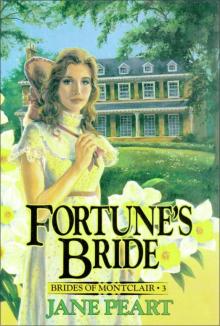 Fortune's Bride
Fortune's Bride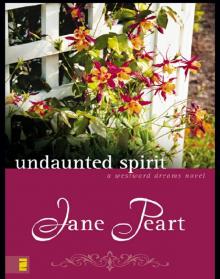 Undaunted Spirit
Undaunted Spirit Love Takes Flight
Love Takes Flight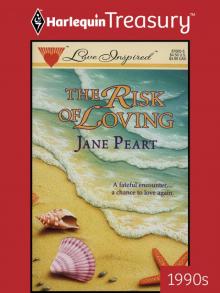 The Risk of Loving
The Risk of Loving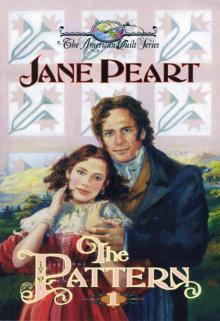 The Pattern
The Pattern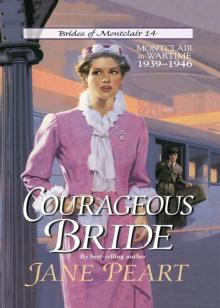 Courageous Bride
Courageous Bride